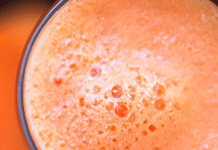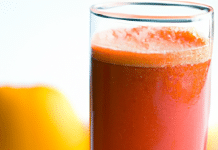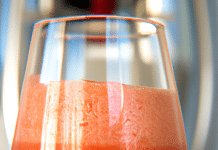Juicing has become increasingly popular as a convenient and efficient way to consume fruits and vegetables.
But the question remains: is it better than eating the whole fruit? In this article, we explore the pros and cons of juicing, its impact on nutrition, and whether the benefits outweigh the potential drawbacks.
So grab a glass of your favorite juice as we delve into this tantalizing debate.
Review contents
Nutritional Content of Juicing
Removal of fiber
The fibrous components are often left behind when fruits and vegetables are juiced. While this can result in a smooth and easily drinkable juice, it also means that the valuable dietary fiber is removed. Fiber promotes healthy digestion, regulates blood sugar levels, and maintains a healthy weight. Without fiber, the juice may not provide the same satiety level and may result in a quicker spike in blood sugar levels.
Loss of vitamins and minerals
Another consideration when juicing is the potential loss of vitamins and minerals. While juicing can be a convenient way to consume a variety of fruits and vegetables, extracting the juice can reduce particular nutrients. Vitamins and minerals can be sensitive to heat and exposure to the air, and the juicing process can expose them to these factors for an extended period. Therefore, consuming fresh juice immediately after preparation is essential to ensure the highest nutritional content.
Increased availability of nutrients
On the other hand, juicing can also have its benefits. By extracting the liquid from fruits and vegetables, juicing can increase the availability of specific nutrients. The nutrients in fresh juice are absorbed more easily by the body because the juicing process breaks down the cellular structure of the produce, making it easier for our bodies to access and absorb the valuable vitamins, minerals, and phytonutrients. This increased availability can be especially beneficial for individuals with compromised digestion or those struggling to eat large amounts of whole fruits and vegetables.
Effects on Blood Sugar Levels
Impact of fiber on blood sugar
Fiber plays a significant role in regulating blood sugar levels. It slows down the digestion and absorption of carbohydrates, preventing sharp spikes in blood sugar levels. When fruits and vegetables are juiced, the fiber is removed, leading to a quicker absorption of sugars into the bloodstream. This rapid increase in blood sugar levels can be problematic for individuals with diabetes or those trying to manage their weight. It is essential to be mindful of the sugar content in juices and consider the overall impact on blood sugar levels.
The rapid increase in blood sugar with the juice
Juices, particularly those with high sugar content, can cause a rapid spike in blood sugar levels. Without the fiber to slow down the absorption of sugars, the body quickly absorbs the concentrated sugars from the juice. This can result in a short-term burst of energy followed by a crash and may contribute to feelings of hunger or cravings for more sugar. It is essential to be mindful of portion sizes and choose juices with a lower glycemic index to minimize the impact on blood sugar levels.
Potential benefits for diabetic individuals
While the rapid increase in blood sugar levels may concern individuals with diabetes, there can still be potential benefits to incorporating juices into their diet. Juices made from low-sugar fruits and vegetables, such as leafy greens or berries, can provide a nutrient-dense option without causing significant spikes in blood sugar. It is crucial for individuals with diabetes to work with a healthcare professional to determine the best approach to incorporating juices into their overall meal plan.
This image is the property of www.planhealthfitness.com.
Digestive Health
Fiber’s role in digestion
Fiber is an essential component of a healthy digestive system. It adds bulk to the stool, promotes regular bowel movements, and supports a healthy gut environment. When fruits and vegetables are juiced, the fiber content is often removed, which can decrease overall fiber intake. This reduction in fiber can impact digestion, potentially leading to issues such as constipation or an imbalance in gut bacteria.
Effect of fiber on gut microbiota
The gut microbiota, composed of trillions of beneficial bacteria, is crucial in maintaining digestive health. Fiber acts as a prebiotic, providing nourishment for these beneficial bacteria. Without an adequate fiber intake, the balance of gut bacteria may be disrupted, potentially leading to digestive issues and a compromised immune system. Therefore, it is essential to consider the impact of juicing on the overall health of the gut microbiota.
Potential digestive issues with juicing
Some individuals may experience digestive issues when consuming large quantities of juice, mainly if their digestive system is not accustomed to the concentrated nutrients in juices. Juices can be more challenging to digest than whole fruits and vegetables due to lacking fiber, leading to symptoms such as bloating, gas, or an upset stomach. It is recommended to start with smaller quantities of juice and gradually increase intake to allow the digestive system to adjust.
Weight Management
Role of fiber in satiety
Fiber plays a crucial role in promoting feelings of fullness and satiety. It adds bulk to the diet, slowing digestion and keeping us satisfied for extended periods. When fruits and vegetables are juiced, the fiber content is reduced, which can result in a less satiating experience. This may lead to increased calorie intake as individuals consume larger quantities of juice without experiencing the same fullness as they would from consuming whole fruits and vegetables.
Caloric content of fruits
While fruits are generally considered healthy and nutritious, it is essential to consider their caloric content. Fruits contain natural sugars and can contribute to overall calorie intake, even when consumed in juice form. Juices made from high-sugar fruits, such as bananas or mangos, can be calorie-dense and may not be suitable for individuals trying to manage their weight. Balancing juice consumption with other low-calorie, nutrient-dense foods is essential to achieve a healthy weight.
Impact on overall calorie intake
Juicing can lead to an increase in overall calorie intake if not consumed mindfully. While fruits and vegetables are nutritious, they also contain calories. It is essential to be aware of portion sizes and consider the overall caloric content of the juice and its impact on daily energy balance. Incorporating juices into a well-rounded, balanced diet that includes a variety of whole foods is critical to achieving and maintaining a healthy weight.
This image is the property of www.plus100years.com.
Antioxidant Activity
Impact of juicing on antioxidant levels
Fruits and vegetables are rich in antioxidants, which help protect the body against oxidative stress and the development of various diseases. While juicing can concentrate some antioxidants, the juicing process can also lead to a loss of specific phytonutrients. Exposure to air and heat during juicing can degrade some antioxidants, reducing their effectiveness. To maximize the antioxidant content of juice, it is crucial to consume it immediately after preparation and choose fresh, high-quality produce.
Beneficial compounds in whole fruits
While juicing can provide a convenient way to consume various fruits and vegetables, it is essential to note that whole fruits contain many beneficial compounds beyond just antioxidants. Whole fruits provide fiber, vitamins, minerals, and other phytonutrients synergistically supporting overall health. Incorporating a combination of whole fruits and juices into the diet can help ensure a well-rounded intake of essential nutrients.
Role of antioxidants in preventing diseases
Antioxidants play a significant role in preventing and reducing the risk of chronic diseases, including heart disease, certain cancers, and neurodegenerative disorders. They help neutralize harmful free radicals in the body, protecting cells from damage and inflammation. While juicing can provide a concentrated dose of certain antioxidants, it is essential to maintain a varied diet that includes a range of fruits, vegetables, whole grains, and lean proteins to receive the full spectrum of beneficial compounds and maximize disease prevention.
Hydration Benefits
Water content in juices
One of the primary benefits of juicing is the high water content in many fruits and vegetables. Juices can contribute to overall hydration, particularly for individuals struggling to consume adequate water. Staying hydrated is essential for maintaining numerous bodily functions, including regulating body temperature, transporting nutrients, and supporting healthy organ function. Juices can be a refreshing and hydrating option, especially when consumed with regular water intake.
Effect on overall hydration
While juices can contribute to hydration, it is essential to note that they should not replace water as the primary source of hydration. Water is the most effective and efficient way to hydrate the body, as it is easily absorbed and contains no additional sugars or additives. Juices can supplement water intake, particularly for individuals who find it challenging to drink plain water. Still, it is crucial to maintain a balanced approach and incorporate various hydrating foods and beverages into the diet.
Potential diuretic effects
Some individuals may experience potential diuretic effects from consuming large quantities of juice. Certain fruits and vegetables, such as watermelon or celery, have natural diuretic properties that can increase urine production. While this can benefit individuals with conditions such as edema or high blood pressure, others may experience an increased frequency of urination. Listening to the body’s signals and adjusting juice intake accordingly is essential, ensuring hydration needs are met without causing discomfort or disrupting daily activities.
This image is the property of nehasfitnessstudio.com.
Ease of Consumption
Convenience and time-saving
One of the primary advantages of juicing is its convenience and time-saving nature. Juices can be prepped and consumed on the go, providing a quick and easy way to incorporate fruits and vegetables into the diet. Additionally, juicing can be an excellent option for individuals who struggle to chew or digest large quantities of whole fruits and vegetables due to dental issues, digestive concerns, or time constraints. Mixing various fruits and vegetables allows for endless flavor combinations and customization to personal preferences.
Different taste and texture
Juicing offers a unique taste and texture experience compared to eating whole fruits and vegetables. By extracting the juice, flavors can be concentrated and combined in novel ways. This can particularly appeal to individuals who may not enjoy the taste or texture of certain fruits or vegetables in their whole form. Juicing can provide a refreshing and enjoyable way to increase fruit and vegetable intake, making it easier and more enjoyable to meet daily nutritional requirements.
Potential lack of satisfaction
While juicing can be a convenient and enjoyable way to consume fruits and vegetables, some individuals may experience a lack of satisfaction when solely relying on juices. Chewing plays a crucial role in digestion and signals to the brain that we are consuming food. When we drink juices, this chewing mechanism is bypassed, which can result in feelings of emptiness or lack of satisfaction. It is essential to balance consuming juices and incorporating whole fruits and vegetables into the diet to ensure physical and psychological satisfaction.
Cost Considerations
Expense of juicing equipment
One factor to consider when deciding whether to incorporate juicing into your routine is the cost of juicing equipment. Juicers can range in price depending on their functionality, brand, and features. High-quality juicers that extract maximum juice and minimize waste can be a significant investment. However, more affordable options are also available for those on a budget. Researching and evaluating the cost and benefits is essential based on individual preferences and needs.
More fruits are needed for juicing
Juicing often requires more fruits and vegetables than consumed in their whole form. This is because the juicing process extracts the liquid portion, leaving behind the fibrous pulp. Using more produce to produce a single glass of juice can increase the overall cost of incorporating juicing into your diet. It is essential to consider the cost of purchasing additional fruits and vegetables and balance it with other nutritional and financial considerations.
Long-term cost comparison
When considering the cost of juicing, evaluating the long-term benefits and potential cost savings is essential. Juicing allows for consuming various fruits and vegetables, which may not be part of a regular diet. By incorporating a greater diversity of produce, individuals can receive a broader range of nutrients and potentially reduce the risk of nutrient deficiencies. Over time, the long-term health benefits achieved through regular juicing may outweigh the initial investment in equipment and additional produce costs.
This image is the property of qph.cf2.quoracdn.net.
Sustainability
Food waste from juicing
One potential drawback of juicing is the generation of food waste. When fruits and vegetables are juiced, the fibrous pulp that is left behind is often discarded. This can contribute to additional food waste, which has environmental implications.
It is essential to consider ways to reduce and repurpose this pulp, such as using it in baking or incorporating it into soups or stews. Additionally, sourcing produce from local farmers’ markets or participating in community-supported agriculture (CSA) programs can reduce the carbon footprint associated with juicing.
Environmental impact of juicing
Juicing can have environmental implications beyond just food waste. The production and disposal of juicing equipment, as well as the energy required for the juicing process, can contribute to carbon emissions and environmental degradation.
It is essential to choose juicers that are energy-efficient and made from sustainable materials. Additionally, selecting organic and locally grown produce can help minimize the environmental impact of juicing.
Utilization of whole fruits
While juicing can provide a convenient and enjoyable way to consume fruits and vegetables, it is essential to consider their benefits in their whole form. Whole fruits and vegetables can be eaten with minimal processing, reducing environmental impact.
By incorporating a variety of whole fruits and vegetables into the diet, individuals can enjoy the full spectrum of flavors, textures, and nutrients while minimizing waste and environmental harm.
Conclusion
In conclusion, the decision to juice or consume whole fruits and vegetables should be based on individual preferences and health goals. While juicing can offer convenience, increased nutrient availability, and hydration benefits, it is essential to consider potential drawbacks such as the removal of fiber, loss of certain nutrients, impact on blood sugar levels, and the potential for increased calorie intake.
Balancing these potential benefits and drawbacks is crucial in incorporating juicing into a well-rounded and balanced diet. It is essential to listen to our bodies and prioritize whole fruits and vegetables while exploring the potential benefits of juicing as a complementary approach to overall nutrition and health.
This image is the property of i.ytimg.com.




































